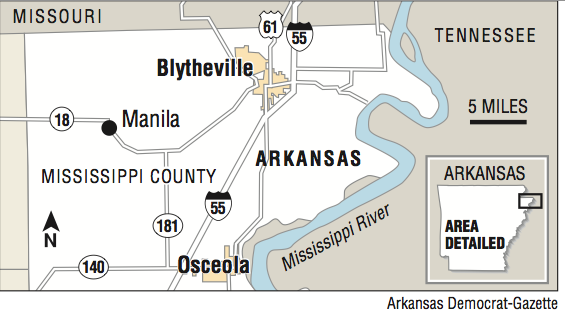A group opposing a plan to build a new courthouse in Blytheville and close the one in Osceola has sued to stop an Aug. 9 election in Mississippi County that would create a sales tax to pay for the construction.
The lawsuit, filed in Mississippi County Circuit Court on behalf of the city of Osceola and two residents, names County Judge Randy Carney, the Mississippi County Quorum Court members, Mississippi County Clerk Janice Currie and the county's Board of Elections.
Mississippi County, with a population of 44,756, has had two county courthouses for nearly 100 years and is one of 10 Arkansas counties with dual county seats. Osceola was chosen as the county seat initially, and a 16,600-square-foot courthouse was built there in 1912.
Seven years later, a courthouse was built in Blytheville after it was designated as a second judicial district in Mississippi County.
Other dual county seats in Arkansas are in Arkansas, Carroll, Clay, Craighead, Franklin, Logan, Prairie, Sebastian and Yell counties. According to popular lore, the system of two courthouses was established to ensure people could travel to a courthouse and back home by horse within a day's time. Swampland, created by the 1811-12 New Madrid earthquakes, made travel difficult in Mississippi County in the early 20th century.
County officials first discussed consolidating the courthouses as a cost-saving measure and looked at building a new courthouse in a central location in the county.
In April, though, Carney said the heating system at the Osceola courthouse needed repairs for at least $60,000 and a leaking roof at the Blytheville courthouse would cost more than $300,000 to replace.
Both buildings were deemed in need of repair with cracking plaster walls and faulty plumbing systems.
The Aug. 9 election seeks a half-percent sales tax to be collected from its passage to March 31, 2046, to fund the $22.5 million courthouse. Plans call for the 55,000-square-foot courthouse to be built in south Blytheville near the intersection of U.S. 61 and Interstate 55.
"The ordinance ... if passed, would no doubt create an irreparable harm," the lawsuit, filed by Little Rock attorney Bart Calhoun, says. "The citizens of Mississippi County would be paying for a courthouse they have not authorized by election."
Calhoun said Tuesday that Blytheville, population 15,120, is not officially a county seat because county records never showed voters ever approved the town as one.
"Just because you have a courthouse, doesn't make you a county seat," Calhoun said.
In 1901, the county was split into two judicial districts -- Chickasawba and Osceola -- for court proceedings. Officials built a courthouse in Blytheville to hold trials in the Chickasawba District. However, Calhoun said, apparently people assumed over the years that it also served for other courthouse proceedings, such as issuance of marriage licenses, land titles and other county business.
Carney said Wednesday that he could not comment on the courthouse issue because of the request for an injunction and referred calls to the county's attorney, Jason Owens of Little Rock. Owens did not return telephone messages.
The request for an injunction also states that the wording on the county's ballot is improper and does not state the amount of tax needed to be levied on a portion that refers to the issuance of bonds.
Wording on the ballot also states that 50 percent of the collected sales tax would be used for "various purposes," including construction, renovation or maintenance of "new or existing courthouses located in Blytheville."
Calhoun said the wording "basically removes Osceola as a county seat."
Ammi Tucker, directer of the Osceola/South Mississippi County Chamber of Commerce, said the loss of the courthouse would hurt downtown businesses in Osceola, population 7,409.
"It would take away the bustling business atmosphere of downtown," said Tucker, noting that she was speaking as an Osceola resident and not the chamber director. "It also takes away the convenience, and it's not an environment we want.
"It's not just sentimental. The courthouse is our identity."
One Osceola business uses a likeness of the courthouse's golden dome as part of the business's logo on its letterhead, she said.
"If we pass a sales tax that extends for 30 years, it's passed on to the next generation," Tucker said. "That's hurtful to businesses all over Mississippi County."
Osceola Mayor Dickie Kennemore said Wednesday that he could not comment about the courthouse because of the litigation.
Calhoun said it would be more economically feasible to make the needed repairs to the courthouses, rather than to collect a sales tax to build a new courthouse.
"I don't know how much it would cost for repairs, but it wouldn't cost $22.5 million to do renovations for both courthouses," he said.
State Desk on 07/14/2016
